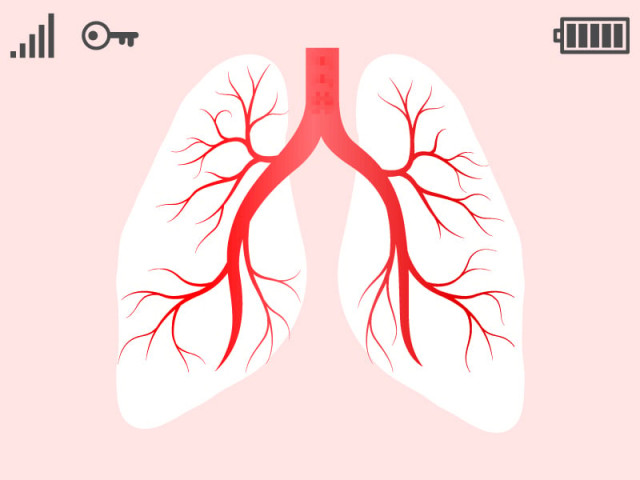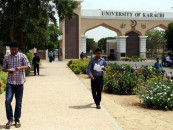World Pneumonia Day: Saving lives with cell phones
Pneumonia claims an innocent child’s life every 30 seconds, making it the number one cause of childhood mortality.

Pneumonia claims an innocent child’s life every 30 seconds, making it the number one cause of childhood mortality. DESIGN: MUNIRA ABBAS
As she steps out of a small grocery store in Korangi, she is carrying her nine-month-old baby in one hand and bags of grocery worth Rs300 in the other. Her baby is pneumonia free and she is one of the lucky mothers who have more than one incentive to ensure her baby gets regular vaccinations at Karachi’s Indus Hospital.
In this part of Pakistan, cell phone technology is being put to good use, often ending up saving precious lives. Under the “Save Life – Zindigi Mehfooz Hai” programme by Interactive Research and Development (IRD), a system has been set up to not just treat children with pneumonia, but track them and their progress by using Radio Frequency Identification (RFID) technology.
In a country where reportedly some 92,000 children under-five die annually of pneumonia, which contributes to 18 % of the total child deaths in Pakistan, this is good news indeed. It is also encouraging that there is no refusal by parents of children when it comes to the pneumonia vaccine. “We have immunised 15,000 children in the last one year in Korangi alone, and not had a single instance of refusal,” says a proud Dr Subhash Chandir, director of vaccines program at IRD. The Pneumococcal conjugate vaccine (PCV) was introduced in Pakistan’s Extended Programme on Immunization in October 2012. “What fundamentally changed the game in Pakistan was not medical advancement but the fact that the price of vaccines came down,” says Dr Aamir Khan, IRD’s executive director , adding that a big part of the solution lies in social business models.

This use of RFID technology started with small water-proof, rugged looking bracelets given to children, which were scanned by assigned health practitioners to get a medical history of the child. Now, a small chip is placed within a sticker on the child’s vaccination card. Through that the child’s progress is tracked and reminder texts are sent. “Apnay phool jaisay bachay ki hifazat karain. Jamal Khan ka agla hifazati teeka aaj lagna hai (Protect your flower-like child, Jamal Khan’s next vaccine is due today).” Standardised texts like these serve as reminders.
To incentivise it further, a “lottery” is set-up whereby one in five mothers with children under the vaccination program may win grocery.
Pneumonia claims an innocent child’s life every 30 seconds, making it the number one cause of childhood mortality in the world. In the 2010 World Health Assembly, a resolution on the prevention and control of childhood pneumonia was passed. The UN MDG 4 states that childhood mortality should be reduced by two-thirds from 1990 to 2015. However, even now, globally an estimated 22 million infants are not fully immunised with routine vaccines.
The PCV vaccine costs around Rs1500 for Pakistan, but people can get their children vaccinated for free. The Hib (Haemophilus influenzae type b) vaccine was introduced in Pakistan even earlier.
Unicef shared with The Express Tribune that “The World Pneumonia Day serves as a call to action for parents, caregivers, and healthcare providers to ensure that infants are fully immunised against all vaccine-preventable diseases. Immunisation prevents between 2 and 3 million deaths globally every year by protecting against the nine deadly diseases of the childhood including pneumonia under 5 years of age.”
While the vaccines are there, they don’t seem to be reaching all Pakistani children who deserve to be vaccinated. “We have a grudge. We are pumping vaccines into a broken system. What needs to be corrected is vaccine delivery,” says Dr Khan. He feels routine immunisation needs to be strengthened, and it is wasteful to introduce new expensive vaccines into a system which is unable to deliver them.
Dr Chandir goes on to explain that the reasons include issues with the “Cold Chain”. Vaccines have to be stored at certain temperatures, but by the time they reach children, they may have lost their effectiveness. “EPI may have a network of vaccinators but often doesn’t have its people in strong positions at district levels. The human resource may not be enough, or is, may be, not being used effectively.”
“It is a crime because it is a right of these children to be protected against these diseases. Usually media stories focus on the vaccines -- and not on the system. We need a better system in the country,” says Dr Khan.
Facts about the disease
• More than 99% of deaths in children due to pneumonia occur in the developing world, with half occurring in five countries – India, Nigeria, Democratic Republic of Congo, Pakistan and Ethiopia.
• Only 61% of children with pneumonia are reportedly taken to a qualified health practitioner in developing countries.
• Globally, pneumonia kills more children under five than any other illness.
• Infants not breastfed are 15 times more likely to die due to pneumonia than those who are.
• Using a clean cook stove results in a 50% reduction in the risk of a child contracting pneumonia.
Source: World Pneumonia Day website
Published in The Express Tribune, November 12th, 2013.



















COMMENTS
Comments are moderated and generally will be posted if they are on-topic and not abusive.
For more information, please see our Comments FAQ